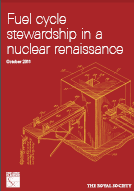
|
News & Views item - October 2011 |
![]() Royal
Society Report Proposes a World Nuclear Forum.
(October 20, 2011)
Royal
Society Report Proposes a World Nuclear Forum.
(October 20, 2011)
The Royal Society has released a report calling for a "World Nuclear Forum" to address issues such as non-proliferation, nuclear governance, and "cradle-to-grave" care of nuclear fuel. According to the report 43 countries currently have nuclear power reactors under construction. Taking an international approach to fuel disposal and storage "may become increasingly important since it is unclear if every nuclear power programme will have the suitable geology and resources to construct and operate a geological disposal facility nationally."
The report discusses best practices for nuclear power programs and makes specific recommendations for Great Britain.
The summary to the 79-page report is reprinted below.
_____________________________________
Many countries worldwide are considering expanding their
civilian nuclear power programmes or even embarking on civil nuclear power for
the first time to help meet their climate change and energy security needs.
Before the earthquake and tsunami hit the Fukushima nuclear power station in
Japan, the nuclear industry projected the world was about to enter a period of
global expansion in nuclear power. Post-Fukushima, this may still remain valid,
although the rate at which nuclear power expands globally may slow.
This so-called ‘nuclear renaissance’ has renewed debate about the relationship
between civil nuclear power and the proliferation of nuclear weapons, as well as
other security risks. Although civil nuclear power has its history in nuclear
weapons, its future is not. In some countries with nuclear weapons, the civil
nuclear industry has become solely a provider of electricity. The good track
record of international non-proliferation safeguards suggests alternative
pathways may be more likely sources of proliferation than the diversion of
nuclear material from civil nuclear power programmes. In many countries, the
industry has moved from being purely state-run, national companies into
multinational enterprises. This increases the transparency of civil nuclear
power programmes and this multinational practice should continue. A fully
internationalised nuclear fuel cycle and thoroughly multinationalised global
nuclear industry may be part of the solution to proliferation, rather than the
problem. A World Nuclear Forum is now timely so that CEOs and government leaders
can explore their respective views on the future development of nuclear power
and responsibilities for non-proliferation and nuclear security.
There is no proliferation proof nuclear fuel cycle. The dual use risk of nuclear
knowledge, materials and technology and in civil and military applications
cannot be eliminated. The technical expertise of the International Atomic Energy
Agency plays a central role in managing this dual use. Improving the efficiency
and effectiveness of international safeguards remains a Research and
Developement (R&D) priority. It is difficult to assess and easy to exaggerate
dual use risks. Risk assessments must be based on a sophisticated understanding
of proliferation that appreciates the wider geopolitical system in which nuclear
technology is embedded. Assessing what level of risk is acceptable remains
ultimately a policy judgment, not a technical one.
Major security incidents, involving non-state individuals or groups, such as
criminal networks and terrorist organisations, have been rare. As demonstrated
by the attention to nuclear safety post-Fukushima, avoiding complacency is vital
to maintain confidence in a nuclear renaissance. An integrated approach to risk
assessment and management needs to feature more prominently at all levels of
nuclear decision making from the design and regulation of nuclear facilities to
the corporate governance of nuclear organisations.
In the rush to construct nuclear reactors, the management of spent fuel and
radioactive waste, including planning for its disposal, must no longer be an
afterthought. Currently, there is no operating civil geological disposal
facility, although disposal plans are well advanced in some countries. The
multi-decade to century timescales involved requires long term, strategic
planning. The entire fuel cycle needs to be considered from cradle to grave to
reduce proliferation and security risks. Long term R&D programmes should be
formulated at the outset so that the capacity to manage spent fuel and
radioactive wastes can be delivered in a timely way. Furthermore, R&D provides
the contingency to address unforeseen changes in policy by keeping future
management options open.
A nuclear renaissance has renewed interest in the potential of offering cradle
to grave fuel cycle services that couple the supply of fresh fuel with the
management of spent fuel and radioactive wastes. Such a comprehensive offer
could be attractive to some countries in preference to developing their own
national fuel cycle capabilities, thereby providing a key non-proliferation
incentive that offers major security benefits. The sensitivities surrounding
such arrangements should not be underestimated. This does not mean that
governments should reject them. By supporting collaborative R&D to explore these
options, governments can keep them open without needing to commit to their
implementation at this stage.
The UK’s role in the development of nuclear technology has been declining over
the last few decades. The UK’s long term ambitions for nuclear power need to be
clearly articulated and implemented if this decline is to be reversed. Enhanced
support for the UK’s research infrastructure is necessary if the UK is to remain
influential in debates on non-proliferation and nuclear security, and thereby
contribute to the responsible stewardship of a global nuclear renaissance.